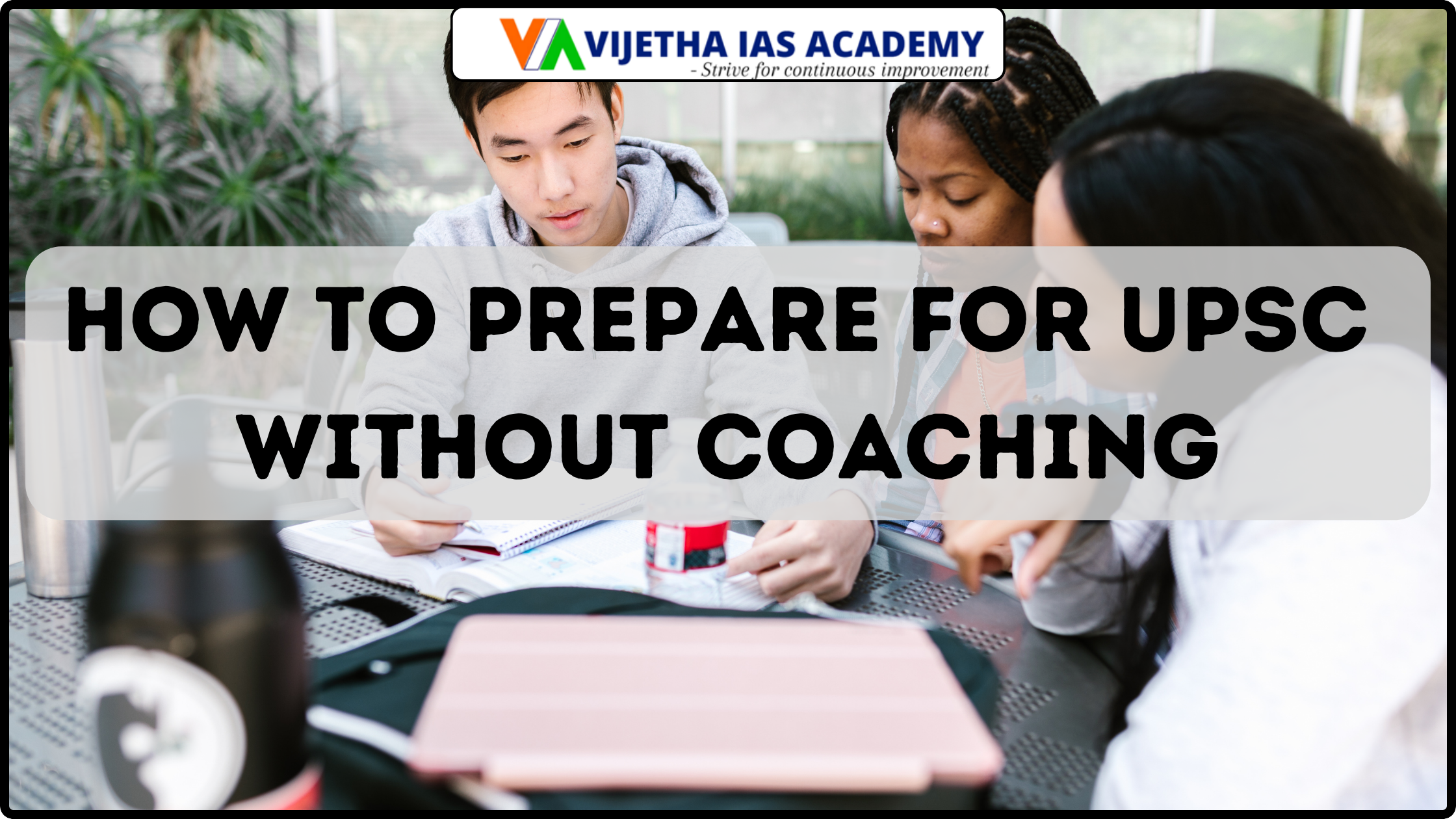
How to Prepare for UPSC Without Coaching
Preparing for the UPSC Civil Services Examination is a formidable challenge, and while coaching can provide valuable guidance, many aspirants successfully navigate this journey independently. In this article, we will explore effective strategies for preparing for UPSC without coaching, incorporating insights from successful candidates and resources like Vijetha IAS Academy and experts such as Kishore sir in Anthropology.
Understanding the UPSC Exam Structure
Before diving into preparation strategies, it’s essential to understand the structure of the UPSC exam. The examination consists of three stages:
- Preliminary Examination: A screening test with objective-type questions.
- Mains Examination: A written examination that includes essay-type questions and papers on various subjects.
- Interview: A personality test that assesses candidates’ suitability for civil services.
Having a clear understanding of this structure will help you tailor your preparation effectively.
1. Create a Structured Study Plan
Set Realistic Goals
Creating a study plan is vital for effective preparation. Set achievable daily, weekly, and monthly goals that align with the vast UPSC syllabus. Break down your subjects into manageable sections to ensure steady progress.
Allocate Time Wisely
Designate specific time slots for each subject, prioritizing topics based on your strengths and weaknesses. This structured approach ensures comprehensive coverage of the syllabus.
2. Utilize Quality Study Materials
Recommended Books and Resources
Without coaching, you’ll need to identify reliable study materials. Here are some recommended resources:
- General Studies: NCERT books, ""Indian Polity"" by M. Laxmikanth, ""Modern India"" by Bipin Chandra, and ""Economic Survey"".
- Current Affairs: The Hindu, Indian Express, and monthly magazines like Yojana and Kurukshetra.
Leverage Online Resources
In today’s digital age, a plethora of online resources can aid your preparation. Websites like Vijetha IAS Academy offer free study materials, notes, and online courses to supplement your studies. Utilize platforms that provide video lectures and discussion forums for peer support.
3. Focus on Current Affairs
Stay Updated Regularly
Current affairs play a significant role in both the Preliminary and Mains exams. Develop a habit of reading newspapers daily and maintaining a dedicated notebook for important news.
Make Use of Online Platforms
Follow reputable websites and social media accounts that provide regular updates on current affairs. You can also subscribe to monthly current affairs compilations to stay informed.
4. Develop a Strong Understanding of Concepts
Prioritize Conceptual Clarity
UPSC exams require a deep understanding of concepts rather than rote memorization. Focus on understanding the underlying principles of topics, which will help you tackle both objective and subjective questions effectively.
Engage with Peer Groups
Joining online study groups or forums can provide a platform for discussing complex topics. Engaging with peers allows you to clarify doubts and gain new perspectives.
5. Practice Writing Skills
Regular Answer Writing
For the Mains examination, effective writing skills are crucial. Practice answer writing regularly to improve your speed and clarity. Aim to write structured answers that address the question directly.
Feedback and Improvement
If possible, find a mentor or peers who can review your answers and provide constructive feedback. This iterative process will enhance your writing skills significantly.
6. Take Mock Tests
Simulate Exam Conditions
Mock tests are invaluable in preparing for the UPSC exam. They help you assess your preparation, manage time, and familiarize yourself with the exam format. Regularly taking mock tests can reduce anxiety on the actual exam day.
Analyze Performance
After each mock test, analyze your performance to identify strengths and weaknesses. Focus on improving areas where you scored poorly and reinforce your strengths.
7. Focus on Optional Subject Preparation
Choose the Right Optional Subject
Selecting the right optional subject is crucial, especially if you're preparing without coaching. Choose a subject that aligns with your interests and strengths. Popular options include Anthropology, Sociology, Geography, and Public Administration.
Study Smartly
For those opting for Anthropology, consider resources from experts like Kishore sir in Anthropology. Online lectures and notes can provide essential insights and clarity on complex topics.
8. Maintain a Healthy Lifestyle
Physical and Mental Well-being
Preparing for UPSC can be stressful, making it essential to maintain a balanced lifestyle. Regular exercise, a healthy diet, and adequate sleep contribute significantly to your overall well-being and focus.
Mindfulness and Relaxation
Incorporate mindfulness techniques such as meditation or yoga into your routine. These practices can help manage stress and improve concentration, which is vital during long study sessions.
9. Time Management
Balance Study and Rest
Effective time management is crucial to avoid burnout. Allocate time for study, breaks, and leisure activities to maintain a balanced approach to preparation.
Set Priorities
Focus on high-yield topics and subjects that carry more weight in the examination. Prioritizing your study schedule ensures that you’re spending time on the most critical areas.
10. Leverage Community Support
Join Study Groups
Connecting with fellow aspirants can provide motivation and support. Study groups facilitate knowledge exchange and create a collaborative environment that can enhance your preparation experience.
Online Forums
Participate in online forums and communities where aspirants share resources, tips, and strategies. Engaging in discussions can deepen your understanding and keep you motivated.
Conclusion
Preparing for the UPSC examination without coaching is entirely feasible with the right strategies and determination. By creating a structured study plan, utilizing quality resources, focusing on current affairs, and practicing writing skills, you can effectively navigate this challenging journey. Institutions like Vijetha IAS Academy offer valuable online resources and support for self-learners, while experts like Kishore sir in Anthropology provide insights that can enrich your preparation.
